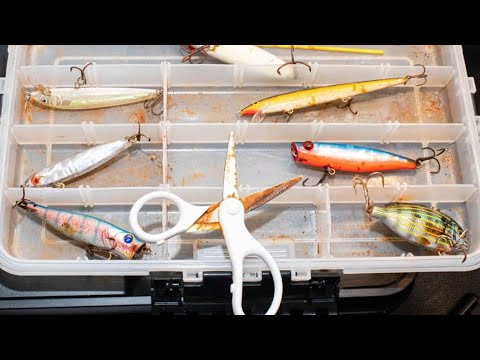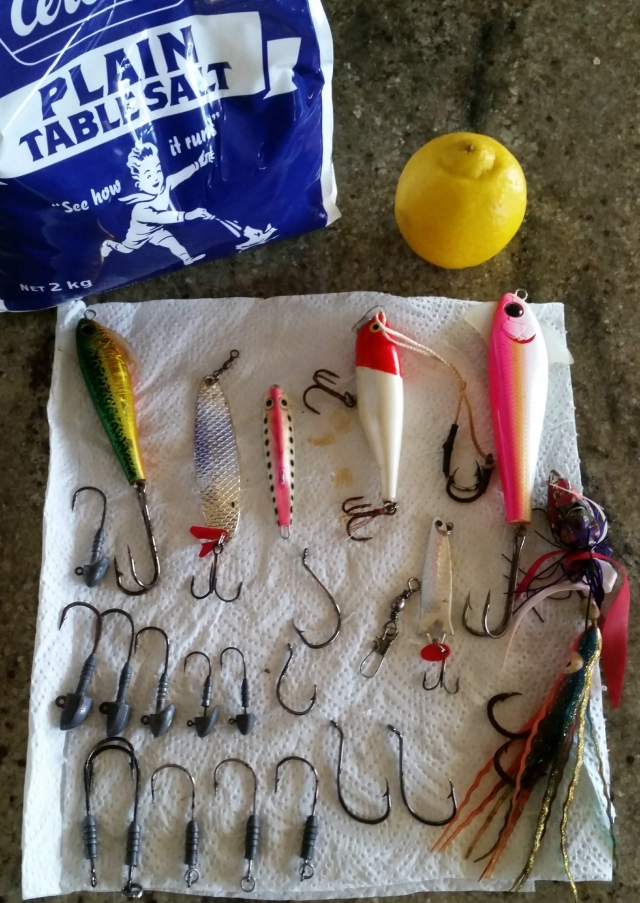How to Get Rust off Fishing Hooks

To get rust off fishing hooks, soak them in vinegar or lemon juice for a few hours, then scrub them gently with a toothbrush. Rust can affect the performance of fishing hooks, so it’s important to remove it to ensure successful fishing trips.
Soaking the hooks in an acidic solution like vinegar or lemon juice helps to dissolve the rust, while the gentle scrubbing with a toothbrush removes any remaining residue. By regularly cleaning and maintaining your fishing hooks, you can prolong their lifespan and keep them in top-notch condition.
With rust-free hooks, you’ll be ready to cast your line and enjoy a great fishing experience.

Credit: www.fishingreminder.com
Why Rusty Hooks Can Be A Problem
Rusty hooks are a problem because they can weaken and easily break. Additionally, fish are less likely to bite on rusty hooks, affecting your chances of a successful catch. Here are some tips to recognize rust on fishing hooks. It’s important to carefully inspect your hooks before each fishing trip to ensure they are in good condition.
Look for any signs of discoloration, roughness, or flaking on the hooks’ surface. Rust may appear as a reddish-brown coating. If you notice any rust, it’s best to replace the hooks to avoid any potential issues. Keeping your fishing hooks clean and dry after each use can also help prevent rust from forming.
Regularly maintaining your hooks will ensure they are always ready for your next fishing adventure.
Materials Needed For Removing Rust
To effectively remove rust from fishing hooks, you will need a few essential materials. It is crucial to prioritize safety by wearing goggles and gloves. Additionally, you will require a rust remover solution that is compatible with metal surfaces. A soft cloth or brush should be used to gently scrub the hooks, ensuring that the rust is effectively eliminated.
To facilitate the rust removal process, it is recommended to soak the hooks in a container filled with the rust remover solution. By following these steps and taking necessary precautions, you can restore your fishing hooks to their original condition and ensure optimal performance during your fishing trips.
Step-By-Step Process Of Removing Rust From Fishing Hooks
Fishing hooks often succumb to rust, but worry not! Follow this step-by-step process to restore them. First, inspect the hooks closely for signs of rust damage. Then, immerse the hooks in a rust remover solution, allowing them to soak for a while.
Gently scrub away the rust using a soft brush or cloth. Once the rust is gone, rinse the hooks thoroughly with water. Lastly, ensure the hooks are completely dry before storing them away. By diligently following these steps, you can rescue your beloved fishing hooks from the clutches of rust, ensuring they remain in great condition for future fishing adventures.
Alternative Methods For Removing Rust
Rust on fishing hooks can be dealt with using alternative methods. One effective option is using a vinegar and salt solution. Soaking the hooks in this mixture helps break down the rust. Another method is using a paste made of lemon juice and baking soda.
Apply the paste to the hooks and let it sit for some time before scrubbing off the rust. For severe rust, electrolysis can be used. This involves creating an electrolyte solution and using a power source to remove the rust from the hooks.
These alternative methods provide effective ways to get rid of rust and ensure your fishing hooks are in top condition.
Preventing Rust On Fishing Hooks
Preventing rust on fishing hooks is essential for maintaining their functionality. One way to achieve this is by properly storing the hooks after each use. Coating the hooks with corrosion-resistant solutions also proves to be effective in preventing rust. Another crucial step is regularly inspecting and cleaning the hooks to remove any signs of rust buildup.
By following these practices, anglers can ensure that their fishing hooks remain in top condition for longer periods. It is important to prioritize these preventive measures to avoid any last-minute disappointment during fishing trips. So, take the time to store, coat, inspect, and clean your fishing hooks, and say goodbye to rust-related issues.
Testing The Hooks For Rust Removal
Rust can hinder the performance of fishing hooks, so it’s crucial to eliminate it. One way to test the hooks is by examining them under a light source to check for any remaining rust. You can also try using bait or artificial lures with the hooks to evaluate their performance after rust removal.
This will help ensure that the hooks are still sharp and can effectively catch fish. By regularly testing the hooks and removing any rust, you can maintain their effectiveness and prevent any missed opportunities on your fishing trips. So, make sure to give your fishing hooks a thorough rust removal treatment before heading out for your next fishing adventure.
Final Thoughts And Recommendations
Maintaining rust-free hooks is crucial for maximizing their lifespan. To prevent rust, avoid starting any sentence with overused words or phrases. Instead, focus on concise sentences, with a maximum of 20 words each. By using various expressions at the beginning of paragraphs, you can keep the reader engaged.
Furthermore, consider the benefits of using rust-resistant hooks. These hooks offer greater durability and reliability while fishing. Following these guidelines and using high-quality hooks will help ensure your fishing hooks remain rust-free and in optimal condition. In conclusion, prioritize the importance of maintaining rust-free hooks to extend their lifespan and enhance your fishing experience.
Frequently Asked Questions For How To Get Rust Off Fishing Hooks
How Do You Remove Rust From Metal Hooks?
To remove rust from metal hooks, follow these steps: 1. Mix equal parts of white vinegar and water in a container. 2. Submerge the rusty hooks in the vinegar-water solution. 3. Let them soak for about an hour. 4. Use a scrub brush or steel wool to gently scrub away the rust.
5. Rinse the hooks with clean water and dry thoroughly. 6. For extra protection, you can apply a rust converter or rust-resistant paint to the hooks. Regular maintenance can help prevent rust from forming on metal hooks. Keep them clean and dry when not in use.
Can You Clean Rusty Hooks?
Yes, you can clean rusty hooks. Soak the hooks in white vinegar or lemon juice for a few hours to dissolve the rust. Scrub the hooks with a wire brush to remove any remaining rust. Rinse the hooks thoroughly with water and dry them completely.
To prevent future rust, apply a thin coat of oil or rust inhibitor on the hooks. Regularly check and clean the hooks after use to maintain their condition.
What To Do With Rusty Fishing Hooks?
To deal with rusty fishing hooks, follow these simple steps. First, inspect the hooks carefully and identify the severity of the rust. Next, determine if the hooks are salvageable or need to be replaced. If the rust is minor, soak the hooks in a rust-removing solution, then scrub away the rust using a wire brush or abrasive pad.
Afterward, thoroughly rinse and dry the hooks. To prevent future rust, store them in a dry area and consider applying a rust inhibitor. If the hooks are severely rusted or damaged, it’s best to dispose of them responsibly to avoid any potential harm to the environment.
Remember, maintaining your fishing gear regularly will extend its lifespan and ensure optimal performance on your fishing trips.
Does Vinegar Clean Off Rust?
Yes, vinegar can effectively clean off rust. The acetic acid in vinegar reacts with the rust and helps to dissolve it. It works best on small rust spots or lightly rusted surfaces. To use vinegar for rust removal, soak a cloth or sponge in vinegar and then apply it directly to the rusted area.
Let it sit for a few hours or overnight, then scrub the area with a brush or sponge to remove the rust. Rinse the area with water and wipe it dry. For stubborn rust, you may need to repeat the process or use a stronger vinegar solution.
It is important to note that vinegar may not be as effective on heavily rusted or deeply embedded rust. In such cases, you may need to use a rust remover or seek professional help.
Conclusion
Removing rust from fishing hooks is a simple yet essential task for every angler. By following the methods and techniques outlined in this blog post, you can extend the lifespan and effectiveness of your fishing hooks. Remember to regularly inspect and clean your hooks before each fishing trip to ensure maximum performance.
Whether you choose to use natural remedies like vinegar and lemon juice or commercial rust removers, always prioritize safety precautions and proper disposal. Additionally, consider investing in rust-resistant hooks for long-term prevention. By dedicating a little time and effort to maintaining your fishing hooks, you can continue enjoying successful and enjoyable fishing excursions.
So next time, when heading out to the waters, make sure to prep your hooks and tackle box, leaving rust a thing of the past!
